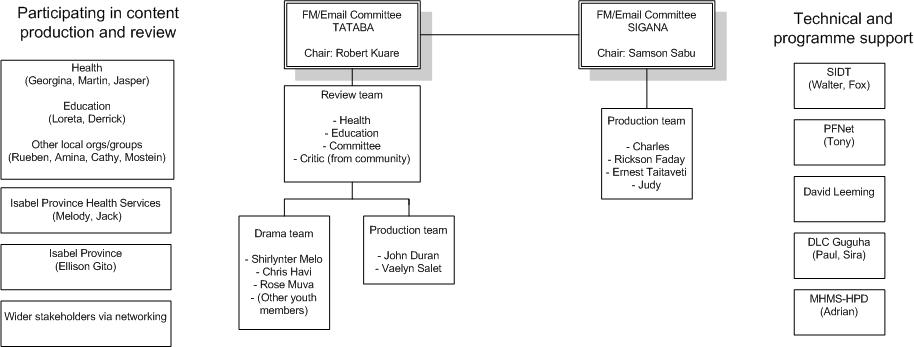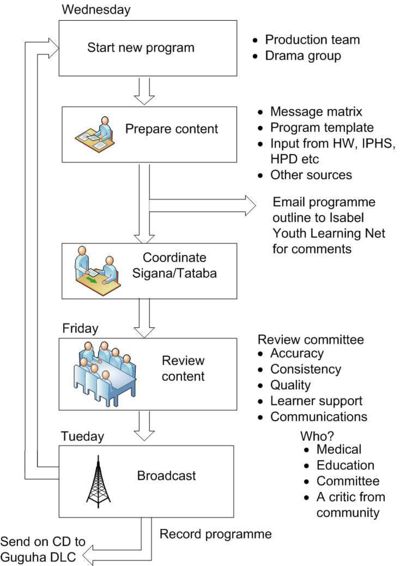Community Media/Isabel/Content Workshops/Tataba/Operational Plan
In order to pool skills and equipment resources, it was decided to implement the programme as a joint operation between Tataba and Sigana on a 50-50 basis.
This operational plan will be presented to IPG and the committees have the expectation that once IPG sees the improved organisation and clear responsibilities, IPG will be more confident of engaging with the FM committees in collaboration and towards the development of Isabel.
The Committees have been hindered in the past by uncertainty over ownership. It is hoped that IPG and the committees can resolve this issue in the near future.
Contents
Coordination between Tataba and Sigana
The learning programmes will be produced in Tataba and recorded content shared with Sigana every 2 weeks when the committees meet.
Sigana can then add their own supporting commentary and local content etc to make their own versions of the programmes, using the Tataba materials as the main content.
Timeline
| Transmitter completed and returned to Tataba | 4th Dec | |
| SIDT finalise agreement with COL | 4th Dec | |
| Operating budget advanced to Tataba FM Chairman by SIDT | 11th Dec | 50% of budget advanced to Committees on signing
Funds to be advanced as cash to Tataba Chairman |
| Publicity | Until 11th Dec | Parts of first programme can be used in FM broadcasts |
| Production | The production teams can start working on Programme 2 as soon as they are ready | |
| Programme 1 broadcast | 8th Dec | Publicity – full programme with learner support |
| Programme 2 broadcast | 15th Dec | (Diabetes Overview) |
| After evidence of 5 programmes produced, broadcast and recorded for upload at Guguha | 3rd week January (approx) | Final 50% of budget advanced to Committees
Funds to be advanced as cash to Tataba Chairman |
| Programme 12 broadcast | 1st week March |
Organisational structure
Production Cycle
Role of the Committees
Responsibilities
- Implement the work plan
- Monitor activities and check scheduled outputs (i.e. the weekly programmes with their learner support activities)
- Coordination
- Ensure review team meets each week
- Tataba/Sigana committees and production teams meet every 2 weeks to discuss progress and share content and ideas
- Monitor staff especially those with honoraria
- Ensure staff carry out their assigned duties defined by their TORs
- Ensure monitoring and communications plans are implemented
- Ensure programmes are recorded and shared with Guguha on CDs sent on ship etc
- Management of assets and equipment
- Carry out inventory
- Monitor equipment / audit against inventory once a month
- Sustainability
- Seek to clarify ownership of the FM stations with IPG
- To engage with IPG to develop understanding and collaboration
- To seek private sector sponsors
- To develop a mid-long term strategy for the development of the FM radio stations and seek funding from donors, linked to the benefits (such as the current health learning programme and the Isabel youth project)
- Seek and request training opportunities for participants, especially technical and youth drama etc
Financial Plan
DRAFT - TO BE DECIDED
The budget will be shared equally between Tataba and Sigana.
SBD (USD 1 = SBD 8)
- Airtime $3,000
- Studio and equipment usage $3,000
- Coordination, transportation and communication $2,500
- Honoraria for production team $4,000
- Tataba $100 (Sigana $50) per person per program broadcast, 2 persons, up to 12 programmes
- Equipment$3,000
- Consideration should be given for a small stipend to be paid to the drama group for each production. This can be used for refreshments, etc
TOTAL SBD $15,500
Terms
The budget is to be used to maintain the station so that the productions can take place. For example, printer ink and paper, batteries for recorders, reasonable communication costs (i.e. email and Breeze card charges) and miscellaneous items needed by production and drama teams.
- First 50% on signing
- Remaining 50% on completion of 5 programmes
Administration
- SIDT to administer.
- Financial reporting
- interim report (end Dec)
- final report (end Feb)
- final acquittal (when funds are fully utilised)
Role of Review team
A review team made up of members from the Health (Clinic), Education (i.e. School Board), Committee and someone from the community will meet with the production and drama teams (Tataba) each week to review the upcoming programme. The Committee will check that this happens.
- Production team and drama group to outline their content and story lines etc
- Review medical accuracy of the content
Review consistency with the programme matrix
- Review quality of the content – criticise and improve
- Check that there is good participation of the community (school, women, youth, etc)
- Production and drama teams to incorporate recommendations
- Inform FM Committee
- Inform IPHS via Health 2-way radio
Role of the Youth Members
- Youth are support groups
- Develop drama on issues for the radio dramas
- Public performances (approved by medical committee)
- Create 1 episode per week (referring to programme schedule)
- Record for the radio programmes
- At least one performance for learner support at suitable occasions
- Look for sponsorship
- Seek to link with NGOs to offer outreach via drama (i.e. market the group to NGOs)
Role of Health Workers
- Data collection
- Clinics
- Provincial health services
- MOH / Diabetic Centre
- Provide information to production team
- Organising staff schedule
- Review production content
- Programme episodes
- Schedule must be systematic
- Linkage with IPHS for endorsement
- Implementation with production team
- Monitoring of programmes
- Evaluation and review
- Incorporation into official health programme
- Seek budgeting support options with IPHS, MHMS
- Integrate into IPHS programme following review
- Coordinate to create efficiencies; i.e. sharing transport
- Motivation
- Award certificates to recognise good work
- Reporting
Production team TOR
- Technical duties
- Broadcasting
- Recording content
- Editing content
- Interviewing
- Drama (character)
- Jingles
- Music
- Quizzes
- Recording and archiving programmes
- Planning
- Production
- Training
- Finance
- Financial monitoring and accounting of consumables (CDRs etc)
- Translating content into local languages
- Training of announcers
- Maintenance
- stationery and consumables
- equipments (and safe keeping)
- Arrange transport
- Reporting
- To committee (using template at agreed intervals. Template includes training and resources needs)
- By email to the Isabel Youth network (descriptive updates for information o wider stakeholder group)
- Sharing radio programmes burned on CD and delivered on the weekly ship with Guguha (for distribution)
Communication Plan
The communications will include PFNet email, text messaging and 2-way health radio calls.
Tataba will be responsible for weekly reports but Sigana can also benefit from the communications.
The communications plan will consist of the following:
- Reporting of progress to programme partners
- Sharing of ideas with the “community of practice” (wider stakeholder group) so that they can help strengthen the content
- Technical support including regular planned mentoring emails and ad-hoc help requests
The required communications will consist of:
- One email to the Isabel Youth Learning Network each week. This can be sent after the review meeting. Please include the following in the email:
- State that this is a regular weekly update as part of the health learning programme “Khabru Mamahe”
- If there is no substantial progress, please do send the email anyway, and just explain that there is nothing to report (but give and background info)
- Report briefly on any programme that may have recently been broadcast.
- Give progress update on the current radio programme.
- Give a brief outline of each of the formats that you are developing (i.e. outline for drama, school quiz, talk session etc)
- Give any comments and recommendations of the review committee so that stakeholders can see the local monitoring process is working.
- State any community reactions, observations from the health clinic, etc
- Anything else you want to add
- One radio call between the Tataba clinic and Buala Hospital each week, reporting that the content has been reviewed by health workers for accuracy, and at the same time the content ideas can be discussed and ideas from IPHS be shared with the local team.
- SMS texting will be used on an ad-hoc basis to ensure critical programme management messages are conveyed to the Chairman and key persons.
Monitoring Plan
The monitoring plan will consist of:
- The weekly review meetings will monitor programme activities and outputs, and also the accuracy of health related messages with reporting to MHMS via IPHS
- Rural Health Clinics in the zone will be used to report back to Tataba clinic the response of the community to the health learning programmes
- During the programme, activities such as listener surveys and feedback from learner support meetings can be conducted
- Questionnaires
- Clinical data

